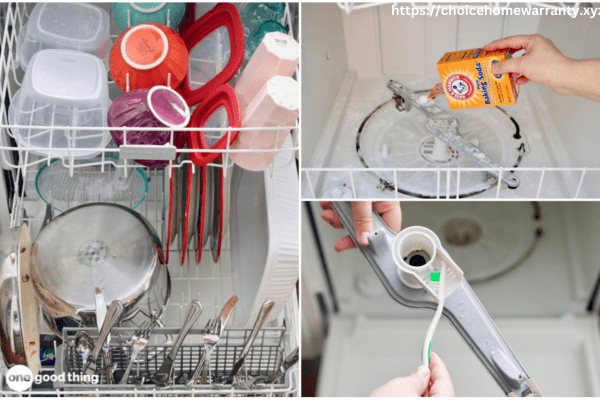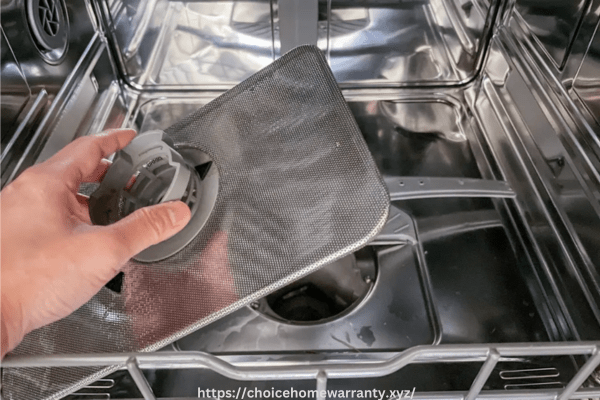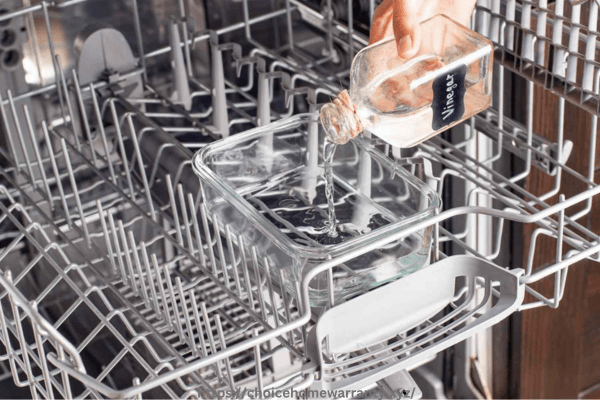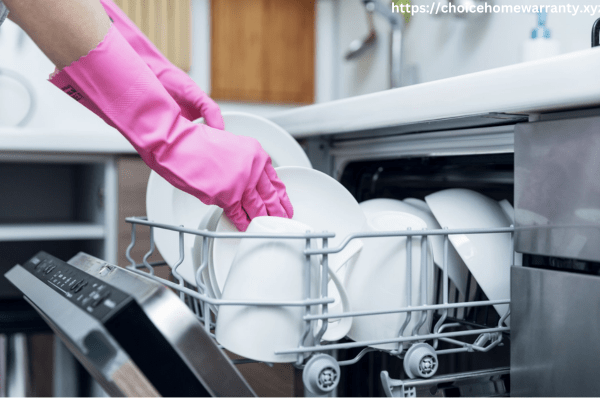Cleaning your dishwasher has never been easier or more important in maintaining its efficiency and longevity. Overlooking this task may seem harmless due to the constant flow of hot soapy water, but it’s crucial to remember that the accumulation of residue, soap scum, and food waste is detrimental. It affects the cleanliness of your dishes and potentially reduces the lifespan of this essential appliance.
The beauty lies in a simple solution – white vinegar! This kitchen staple not only shines your glassware but acts as a super cleanser for your dishwasher as well. By detaching debris with its potent acidity during a hot water cycle, it restores the efficiency of your appliance like magic. Placed in an empty dishwasher-safe bowl on the top rack, 1 cup is all it takes to clean a grimy dishwasher while you can sit back and enjoy peace at its performance peak.
Why Clean Your Dishwasher Regularly?
Why should you clean your dishwasher regularly? Regular cleaning of your dishwasher is crucial in order to evade potential hazards associated with a neglected appliance. In addition to compromising the cleanliness of your dishes, neglecting them can cause mechanical issues that might cost a lot of money to fix or even replace. Thus, it’s essential to maintain clean your dishwasher if you want to guarantee its durability and effectiveness.
Understanding Dishwasher Build-Up
Understanding dishwasher build-up is essential for maintaining the longevity and efficiency of your appliance. Food particles, grease, and soap scum may appear to be harmless; however, their accumulation in your dishwasher can greatly impact its performance. Among the many issues that might arise from this build-up are unpleasant smells and decreased cleaning effectiveness. For this reason, keeping clean your dishwasher on a regular basis is strongly suggested in order to maintain its efficiency.
Issues with Hard Water
Hard water can pose a variety of issues for homeowners, particularly in terms of household appliances like dishwashers. For those dealing with hard water, additional problems might arise such as discoloration and mineral build-up. These issues not only compromise the aesthetic appeal of your dishwasher but can also cause significant damage to its internal components. Therefore, it is crucial to regularly clean your dishwasher to avoid the detrimental effects of hard water.
Bacteria and Fungi in Your Dishwasher
The National Centre for Biotechnology Information has published a startling new study that suggests that dishwashers might serve as a sanctuary for bacteria and fungi. This potential health risk highlights how crucial it is to maintain a clean and hygienic dishwasher. Therefore, it is essential that you clean your dishwasher on a regular basis to ensure that it is clear of harmful bacteria.
Step-by-Step Guide to Cleaning Your Dishwasher
It may surprise you to learn how simple it is to clean your dishwasher. To guarantee that your dishwasher stays new and operates at its best, take the following actions:
Gathering Necessary Supplies
Items needed for effective cleaning
Preparing the Dishwasher
Emptying the dishwasher and inspecting for visible debris
Cleaning the Interior and Exterior
Wiping down surfaces and addressing stains
Addressing Filters and Drains
Removing and cleaning filters and drains

Natural Cleaning Solutions
Opt for natural cleaning solutions to preserve the condition and longevity of your dishwasher. These alternatives help avoid the damage that harsh chemicals may inflict on your appliance over time. Homemade cleaners, which can be made using common household ingredients like baking soda and vinegar, are an excellent option. They effectively tackle build-up and grime without compromising the lifespan of your dishwasher. Therefore, regularly clean your dishwasher with these natural solutions to ensure its optimal performance.
Regular Maintenance and Clean Your Dishwasher Tips
When it comes to maintaining the efficiency and longevity of your dishwasher, regularity is key. Implementing a routine of natural cleaning solutions can significantly help in preventing escalating issues. It’s vital to recognize signs that your dishwasher requires cleaning, such as unpleasant odors or visible grime, and establish a regular maintenance schedule. This technique helps your dishwasher operate better overall in addition to guaranteeing cleanliness. Recall that an efficient dishwasher is one that is kept up.
Common Mistakes to Avoid
A few common mistakes might be impeding your cleaning efforts, especially when it comes to your dishwasher. Strong chemicals should be avoided since they have the potential to damage the appliance over time.
Your dishwasher’s general efficiency and cleanliness may be substantially increased by paying close attention to certain components, such as the spray arms and filter. Furthermore, avoiding overcrowding the dishwasher ensures that every dish is perfectly clean and prevents damage to both the dishes and the appliance. Maintaining a clean and functional dishwasher requires these elements.
The Impact on Dishwashing Performance
The impact on dishwashing performance from regular cleaning is significant, leading to enhanced cleanliness of dishes and an extended lifespan for your dishwasher. By investing time in routine maintenance, you ensure the optimum performance of your appliance. The payoff is not just cleaner dishes but also a well-functioning dishwasher that lasts longer. Therefore, it’s wise and beneficial to regularly clean your dishwasher.
How to Deal with Lingering Odors
Dealing with lingering odors requires a strategic approach, wherein identifying the source of the odors is crucial for their effective elimination. One of the common household items where unpleasant smells may persist is your dishwasher.
In order to curb this issue, natural deodorizers can be employed as they help maintain a pleasant aroma inside your dishwasher, effectively neutralizing any foul scents. Furthermore, regular cleaning of your dishwasher is an essential step in preventing the buildup of such odors, contributing significantly towards maintaining a fresh and clean environment in your home.
Benefits of a Clean Dishwasher Beyond Performance
More benefits than merely improved dishwashing arise from having a clean dishwasher. Regular cleaning and maintenance of your dishwasher not only ensures peak performance but also offers significant health benefits.
A clean dishwasher protects you and your family from potential health risks by eliminating harmful bacteria and germs that might contaminate your dishes. Furthermore, a dishwasher that is kept up properly consumes less water and electricity, which benefits the environment. Thus, maintaining a clean dishwasher has several advantages that extend beyond its functionality.
Frequency of Dishwasher Cleaning
The regularity of dishwasher cleaning is essential to preserving its effectiveness and extending its life. Cleaning your dishwasher on a regular basis is essential to prevent the buildup of food particles, bacteria, and germs that might clog its mechanism. Frequent washing helps to avoid offensive smells from arising and guarantees that your dishes are well-cleansed.
Ignoring this essential maintenance routine might lead to mechanical issues or even reduce the overall performance of the appliance. Therefore, keeping clean your dishwasher should be an integral part of your kitchen cleaning regimen.
Monthly Cleaning
When it comes to maintaining your dishwasher, the golden rule is to conduct a thorough cleaning on a monthly basis. This frequency is usually sufficient for an average household and ensures that the machine remains in top-notch condition without necessitating constant deep cleaning. By adhering to this routine, you can ensure a longer lifespan for your dishwasher and optimal performance when cleaning your dishes.

Scrape and rinse habits
The habits of scraping and rinsing play a significant role in how you prepare your dishes before loading them into the dishwasher, which ultimately determines the frequency of required dishwasher cleaning.
If you are conscientious about thoroughly scraping off food residue and rinsing your dishes prior to placing them in the dishwasher, then you may find that your filter only requires a deep clean once a year. However, even with such diligent habits, it is still important to periodically clean your dishwasher to ensure its optimal performance.
Dish loading habits
Consider your dish-loading habits. How often you clean the filter in your dishwasher depends largely on how many loads you handle each week and how often you use it. Your dishwasher will require more frequent cleanings to be effective the more often you use it. Therefore, regular cleanings are essential to the dishwasher’s longevity and seamless operation.
Frequency based on dish preparation methods
The frequency of cleaning a dishwasher filter is often determined by the methods used in dish preparation. For individuals who do not scrape or rinse their dishes before placing them in the dishwasher, the task of cleaning the filter might become a regular monthly ritual.
The necessity for this tends to vary based on how frequently the dishwasher is used and whether visible scraps or debris are present. Therefore, it is important to maintain cleanliness within your dishwasher to ensure its optimal performance.
Signs Your Dishwasher Needs Cleaning
If your dishes don’t appear as beautiful as they did when they were taken out of the dishwasher, it could be time to clean your dishwasher. Other telltale signs might include persistently bad odors, a build-up of food particles or dirt in the unit’s bottom, or a general performance deterioration.
Additionally, you may view standing water in your dishwasher when a cycle is ended. These symptoms shouldn’t be ignored since they might get worse if you don’t address them straight away. Therefore, regular maintenance and cleaning are required to ensure optimal performance from your dishwasher.
Visible scraps or debris
Visible scraps or debris are clear indicators that your dishwasher needs attention. It is essential to note that the presence of such waste materials in the filter can obstruct its normal functioning. A free-flowing filter can be maintained with routine inspections and cleaning, ensuring your dishwasher runs as efficiently as possible. Consequently, maintaining the cleanliness of your dishwasher is essential to its longevity and improved functionality.
Dirty or gritty dishes after washing
Your dishwasher’s filter has to be thoroughly cleaned if your once-sparkling dishes are now coming out of the machine appearing grimy or grainy. Food particles and other debris can block the filter over time, making dishwashing less effective and leaving your dishes with a dirty residue. Maintaining consistent cleaning schedules for your dishwasher’s parts is crucial to restoring its efficiency and cleanliness.
Importance of a Clean Filter
It is impossible to exaggerate the significance of having a clean filter, particularly for appliances like your dishwasher. A clean filter ensures optimal performance by allowing water and detergent to effectively circulate during the wash cycle, resulting in spotless dishes every time.
In addition, a filthy filter might shorten your dishwasher’s lifespan and cause offensive odors. As a result, the longevity and effectiveness of your dishwasher’s filter depend on routine maintenance and cleaning.
Preventing clogs
Preventing clogs in your dishwasher is crucial for its optimal functioning. The filter of your dishwasher acts as a safeguard, defending the pump against blockages induced by debris and large fragments of food. Frequent cleaning keeps the filter free-flowing, which guarantees hassle-free dishwasher operation. Therefore, it’s critical to clean your dishwasher on a regular basis.
Enhancing dishwasher efficiency
You may increase your dishwasher’s efficiency by keeping its filter clean. In addition to preventing blockages, a clean filter improves your appliance’s overall efficiency. Being able to wash dishes without having to deal with pre-rinsing is the benefit of this easy maintenance. Thus, in order to guarantee your dishwasher’s best performance, it’s imperative that you maintain it clean.
Best Practices for Dish Preparation
Keeping clean your dishwasher is the first step in following best practices for dish preparation. Maintaining a clean dishwasher extends its lifespan and improves efficiency in addition to ensuring the hygiene of your dishes.
Cleaning your dishwasher on a regular basis may help avoid the accumulation of food particles, oil, and soap scum, which can cause bad smells and decreased functionality. Moreover, it can help avoid potential repairs or replacements down the line. Therefore, keeping clean your dishwasher is an essential part of dish preparation best practices.
Pre-rinsing and its importance
Peregrinating dishes is an important but seemingly paradoxical step, as the primary function of a dishwasher is to clean dishes. However, pre-rinsing is crucial to keeping your dishwasher efficient and long-lasting.
It assists in clearing out food particles and debris that can damage the pump system. In doing so, it protects the pump system from harm and enables the filter to function more efficiently. Pre-rinsing therefore helps to preserve the lifespan and general functionality of your dishwasher in addition to making your dishes seem cleaner.
Surprising revelation about dish preparation methods
Intriguingly, among the various strategies employed in preparing dishes for the dishwasher, one method stands out as the most beneficial for your machine. This may come as a surprising revelation given that common practice often overlooks this crucial step – cleaning your dishwasher. Stay tuned as we delve deeper into this topic and uncover the importance of maintaining a clean dishwasher for optimal dishwashing results.
How to Perform a Thorough Cleaning
There are a few measures you must take in order to clean your dishwasher thoroughly. Empty the dishwasher first, then clean the filter of any food residue. Then, place a cup of white vinegar on the top rack and run a hot water cycle to eliminate grease and grime.
After that, sprinkle baking soda at the bottom and run another short hot-water cycle to deodorize and remove stains. Ensure that you wipe down the edges and seal the dishwasher door as they tend to collect residues over time. Regularly maintaining your dishwasher in this manner can help it work more efficiently and last longer.

Getting Started Clean Your Dishwasher
Before diving into the cleaning process, gather the necessary tools:
- Washcloth
- Grease-cutting dish soap
- Gloves (optional)
- Soft toothbrush
- Toothpicks
- Owner’s manual
- Vinegar (no more than 5 percent acetic acid)
- Baking soda (optional)
- 1 to 2 cups of lemon juice (optional)
- 1 package of unflavored lemonade mix (optional)
Now, let’s begin with a clean, empty dishwasher.
Cleaning the Racks
- Remove the bottom and silverware racks: Wash them in warm soapy water, using a toothbrush for hard-to-reach corners. Rinse and set aside.
- Top rack maintenance: If removable, clean it separately. If not, wipe it down with a damp cloth, addressing any visible mess with a toothbrush or cloth.
Filter Maintenance
- Remove the filter: Consult your owner’s manual for safe removal. Clean debris caught in the filter, and gently wash it until clean. Use a soft toothbrush for stubborn residues. Reattach following the manual’s instructions.
Spinner Arm Maintenance
- Clean spinner arm(s) holes: Use toothpicks to clear any debris. Some bottom spinner arms have holes underneath, spray into the filter to keep it clean. Refer to the manual on how to remove it if necessary.
Gasket and Interior Cleaning
- Wipe down gaskets, door, and interior: Use a damp cloth with grease-cutting dish detergent. The toothbrush helps reach corners and crevices, especially in common microbial areas like gaskets.
- Reassemble the dishwasher: Put the racks back in place.
Deep Cleaning Controversy
- Using Vinegar: Place 2 cups of white vinegar in a dishwasher-safe cup on the bottom rack. Run a cycle without detergent. Vinegar helps with clogs, and bad smells, and dissolves built-up residue. However, be cautious as it can damage rubber seals and hoses if used excessively.
- Alternative: Lemonade Mix: Unflavored, unsweetened lemonade mix can substitute vinegar due to its citric acid content. Ensure it contains citric acid before use. Note that citric acid is stronger than acetic acid found in vinegar.
Extra Mile: Baking Soda Cleanse
- Baking soda application: Scatter a cup of baking soda on the bottom and run a short hot cycle or leave it overnight for enhanced odor and stain fighting.
- Lemon Juice Option: To counteract the vinegar smell, run lemon juice through the machine. Place a cup or two in a dishwasher-safe cup on the top rack for a refreshing lemon scent. Be cautious, though, as this introduces more citric acid.
How to Perform a Monthly Cleaning for Your Dishwasher
Performing a monthly cleaning of your dishwasher is an essential task to maintain its efficiency and durability. To start, empty out any dishes and remove the racks. Scrub off any food debris or residues from the walls and corners. Next, place a cup of white vinegar in the upper rack and run the dishwasher on a hot cycle, which will help in removing grease and unpleasant odors.
After this, sprinkle some baking soda at the bottom and run a short cycle again. This step helps in further deodorizing and brightening your dishwasher. Regular maintenance like this ensures that your dishwasher stays clean and works optimally for longer periods.
Monthly Cleaning: More Than Just Filter Maintenance
Monthly cleaning of your dishwasher involves more than just regular filter maintenance and routine vinegar cleanses. While these steps are indeed essential, several other aspects require attention to keep your appliance in optimal condition.
A comprehensive monthly cleaning routine involves a thorough inspection of all elements of the dishwasher, ensuring that each part is clean, functioning correctly, and free from any potential issues. This routine not only helps maintain the performance efficiency of your dishwasher but also extends its overall lifespan.
Dealing with Large Debris and Obvious Goop
Before diving into deep cleaning sessions, it’s essential to deal with large debris and obvious goop. Regularly clearing any substantial debris from the filter is crucial as this can prevent potential damage to your dishwasher. Additionally, using a cloth to wipe away any noticeable residue ensures a cleaner environment for your dishes. This simple step can drastically improve the overall cleanliness of your dishwasher and its performance in washing your dishes.
Vinegar Cleanses: When and Why
Vinegar is an effective agent for deep cleaning sessions, particularly when you are dealing with problems such as staining, hard water issues, or stubborn odors. Setting aside vinegar cleansers for these specific situations is a smart move that enhances your dishwasher’s general health in addition to making it cleaner. You can preserve the efficiency of your dishwasher and increase its longevity by doing this. For this reason, cleaning your dishwasher with vinegar is both essential and helpful.
Premium Dishwasher Cleaners: A Manufacturer’s Recommendation
Most dishwasher manufacturers highly recommend the use of premium dishwasher cleaners for monthly maintenance routines. These superior-quality cleaners play a vital role in ensuring that your dishwasher remains in optimal condition, thereby enhancing its lifespan. Interestingly, some premium dishwasher detergent pods have been innovatively designed to include a separate component of dishwasher cleaner.
However, while these advanced cleaners are beneficial, they should not replace the need for comprehensive manual cleaning. It is essential to thoroughly wipe down critical areas within your dishwasher regularly to maintain its performance and efficiency.
Targeting the Gaskets and Hard-to-Reach Places
On a monthly basis, it is crucial to target the gaskets and hard-to-reach places in your dishwasher during cleaning. These areas may be overlooked by the wash water during the cycle, thus requiring extra attention. By meticulously cleaning these parts, you can ensure that your dishwasher operates at its optimal level. This process eradicates any hidden grime that might hinder its efficiency. Therefore, always remember to clean your dishwasher thoroughly for better performance.
Pre-Loading Rituals: Do I Really Need to Wash my Dishes Before I Load Them?
Pre-loading rituals often lead to the question, Do I really need to wash my dishes before I load them? It has been shown that contrary to popular perception, pre-rinsing dishes might actually make them dirtier in addition to wasting expensive resources. It’s better to just scrape your dishes before putting them in the dishwasher rather than washing them.
This practice improves the efficiency of your dishwasher’s cleaning cycle in addition to having a good influence on energy and water consumption. It is also important to maintain your dishwasher clean for its optimal performance.
Detergent Requirements for Optimal Performance
Discover the importance of leaving some food residue on your dishes before loading them into the dishwasher for optimal performance. The recommended dishwasher detergent requires a specific amount of residue and grease to work effectively.
If you overly rinse your dishes, it can lead to an imbalance, causing excess foam which can potentially damage your machine. This highlights the need for a balanced approach to pre-loading rituals in order to maintain and keep your dishwasher functioning properly.
How Often Do Americans Use Their Dishwashers?
Americans’ usage of dishwashers is a fascinating topic, as revealed by insights from the Residential Energy Consumption Survey. This survey uncovers surprising statistics about dishwasher usage patterns in American households, comparing their use to other household appliances.
It was found that income levels significantly impact both dishwasher ownership and usage frequency. For instance, higher-income households are more likely to buy and utilize dishwashers than lower-income ones. Despite the fact that your dishwasher is an essential appliance, it’s important to remember that it needs regular maintenance, including cleaning for optimal performance.

The Energy Efficiency Dilemma: Dishwasher vs. Hand Washing
The Energy Efficiency Dilemma: Dishwasher vs. Hand Washing presents an in-depth comparison of the energy and water usage between these two methods of dish cleaning. This comparison allows us to understand the significant advantages of using a dishwasher, not only in terms of energy efficiency but also for resource conservation.
Interestingly, this analysis provides valuable insights that debunk the common perception of hand washing being environmentally friendly. It demonstrates that, against common assumptions, hand washing requires more water and energy than using a dishwasher. Therefore, it’s crucial to clean your dishwasher on a regular basis to ensure sustainability and efficiency.
Scraping vs. Washing and the Eco-Friendly Choice
In terms of environmental impact, scraping is preferable to washing dishes, therefore make the switch to scraping your dishes before putting them in the dishwasher. This small adjustment prolongs the life of your dishwasher and enhances its performance and operation.
You may save time and resources by conserving water and electricity by operating your dishwasher more efficiently. This strategy is in complete harmony with the environmentally beneficial recommendations put forward by the Energy Star initiative. Remember to clean your dishwasher on a regular basis to maintain it functioning successfully and efficiently.
Conclusion
Regular dishwasher cleaning is not only a matter of preference; it’s also required for appliance efficiency and health. Frequent cleaning helps avoid the accumulation of oil and food particles, which can cause bad smells and a reduction in cleaning efficiency.
The fact that it stops possible bacterial development that might contaminate your dishes is more significant. In order to prevent unwelcome chemical residues on your utensils, always use natural, non-toxic items. So make it a habit to clean your dishwasher at least once a month; your dishwasher takes care of your dishes, so it’s time for you to take care of it!
FAQs About Clean Your Dishwasher
Are pre-rinsing dishes necessary for a clean wash?
Pre-rinsing is not recommended, as it can lead to dirtier dishes and unnecessary resource wastage. Scraping is sufficient for optimal dishwasher performance.
How often should I use premium dishwasher cleaners?
For regular maintenance, use premium dishwasher cleaners monthly. However, these should complement the thorough wiping down of critical areas.
What is the impact of income on dishwasher usage?
Older dishwashers that are not in use are more common in lower-class homes. Dishwashing by hand is less water and more energy-efficient than using a dishwasher.
How much water and energy does hand washing vs. dishwasher use?
Hand washing uses more water and electricity than using a dishwasher. A dishwasher consumes significantly less water and energy, making it the eco-friendly choice.
Any tips for prolonging the dishwasher’s life?
Regularly clean the filter, target gaskets, and hard-to-reach places monthly, and avoid pre-rinsing dishes for optimal performance.
How frequently should my dishwasher be cleaned?
Regular cleaning is recommended, ideally once a month, or more frequently if you notice signs of build-up.
Can I clean my dishwasher with bleach?
While bleach is effective, it’s advisable to use milder, natural alternatives to avoid potential damage to your dishwasher.
What are the signs that my dishwasher needs cleaning?
Foul odors, reduced cleaning efficiency, and visible build-up are common indicators that your dishwasher requires cleaning.
Is it necessary to clean filters and drains regularly?
Yes, cleaning filters and drains prevents clogs and ensures proper water drainage, enhancing the overall performance of your dishwasher.
Can a dirty dishwasher pose health risks?
Yes, according to research, dishwashers can harbor bacteria and fungi, emphasizing the importance of regular cleaning.
